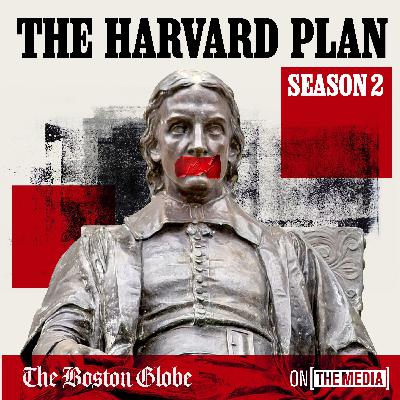Discover On the Media
On the Media

On the Media
Author: WNYC Studios
Subscribed: 47,845Played: 1,813,513Subscribe
Share
© WNYC
Description
The Peabody Award-winning On the Media podcast is your guide to examining how the media sausage is made. Hosts Brooke Gladstone and Micah Loewinger examine threats to free speech and government transparency, cast a skeptical eye on media coverage of the week’s big stories and unravel hidden political narratives in everything we read, watch and hear.
1825 Episodes
Reverse
If you’ve ever donated to a Democratic candidate, you’ve probably been rewarded with a never-ending stream of pleas for more money in your inbox. And we’re not talking about polite reminders. Demands are often in ALL CAPS. Attached to names of celebrities like GEORGE CLOONEY or TAYLOR SWIFT. And warnings that something awful is about to happen.Adam Bonica is a political scientist at Stanford University who writes a Substack newsletter called On Data and Democracy. He reached his breaking point with Democratic Party spam last year, and decided to investigate why they landed on this strategy, and how effective it really is.
On the Media is supported by listeners like you. Support OTM by donating today (https://pledge.wnyc.org/support/otm). Follow our show on Instagram, Twitter and Facebook @onthemedia, and share your thoughts with us by emailing onthemedia@wnyc.org.
The Trump administration is asking universities to sign an agreement in exchange for preferential access to federal funding. On this week’s On the Media, how the arrangement would radically alter the relationship between the government and higher education. Plus, how university leaders are navigating the fight over academic freedom.[00:00] Universities were not always so vulnerable to the whims of politics. The whole system of taxpayer-funded, university-led scientific research came about at the end of World War II, and was the brainchild of a man named Vannevar Bush. He felt the partnership of government and academics had to be equal in order to yield breakthroughs. Today, the Trump administration is proposing a new “compact” that would make the President the dominant partner. We speak with one of the authors of the Trump compact, May Mailman.
On the Media is supported by listeners like you. Support OTM by donating today (https://pledge.wnyc.org/support/otm). Follow our show on Instagram, Twitter and Facebook @onthemedia, and share your thoughts with us by emailing onthemedia@wnyc.org.
Back in October, Nick Fuentes, the Gen Z white nationalist influencer, was trending in the news after a leaked Young Republicans chat revealed how his ideas were taking hold in some conservative circles. Then, just a week or so later, Fuentes sat down for an interview with Tucker Carlson. That 2-hour interview triggered a crisis amongst the GOP’s top brass that pitted major conservative influencers against each other, and garnered headlines declaring the start of a Republican “civil war.” For this midweek podcast extra, host Micah Loewinger called up Zack Beauchamp, senior correspondent for Vox, to wade through the fallout around Fuentes and Carlson, and break down what this tells us about antisemitism in American politics.
On the Media is supported by listeners like you. Support OTM by donating today (https://pledge.wnyc.org/support/otm). Follow our show on Instagram, Twitter and Facebook @onthemedia, and share your thoughts with us by emailing onthemedia@wnyc.org.
Millions of dollars in federal grants have been terminated, throwing cutting-edge research at American universities into crisis. On this week’s On the Media, meet the two men at the center of the fight over the future of academia.[0:00] Harvard president Alan Garber and National Institutes of Health director Jay Bhattacharya are at the heart of the national fight over the future of academia. Alan Garber has been cast as the defender of academic freedom and democracy; Jay Bhattacharya is Donald Trump’s pick to lead the NIH, the agency withholding billions of dollars in research grants from Harvard. Oddly enough, the two men go way back: Garber was Bhattacharya’s undergraduate thesis adviser and mentor in the late 1980s. This episode tells the story of how the two men found themselves adversaries — and what it means for the future of science.
On the Media is supported by listeners like you. Support OTM by donating today (https://pledge.wnyc.org/support/otm). Follow our show on Instagram, Twitter and Facebook @onthemedia, and share your thoughts with us by emailing onthemedia@wnyc.org.
Zohran Mamdani has won the 2025 New York City mayoral race, with a higher turnout of voters than New York has seen in decades. This despite the fact that New York’s senators — Chuck Schumer and Kirsten Gillibrand — did not back Mamdani, and House Democrat Leader Hakeem Jeffries waited until the day before early voting began to endorse the Democratic nominee.Mamdani’s divided party support reflects an intensifying argument over whether Democratic candidates must move closer to the political center - or further away - in order to win. Brooke speaks with Elliott Morris, a journalist, statistician, and author of the data-driven news website Strength in Numbers, about what the numbers say around moderation and why it might not be the silver bullet Democratic strategists seemed to crave.Further reading:Moderation is not a silver bullet, by Elliott MorrisThe Strategist’s Fallacy in American politics, by Elliott Morris
On the Media is supported by listeners like you. Support OTM by donating today (https://pledge.wnyc.org/support/otm). Follow our show on Instagram, Twitter and Facebook @onthemedia, and share your thoughts with us by emailing onthemedia@wnyc.org.
President Trump is compelling universities across the country to adopt a more conservative agenda in exchange for access to federal funds. On this week’s On the Media, how this pressure campaign is playing out at the oldest and richest university in America: Harvard.[0:00] Our latest collaboration with the Boston Globe is Season Two of The Harvard Plan, in which reporter Ilya Marritz explores what has unfolded at Harvard University since Donald Trump’s inauguration. Three members of the university community tell the story: Ryan Enos, a political scientist, Kamila Naxerova, a genetics professor and cancer researcher, and Kit Parker, a lieutenant colonel in the United States Army Reserve and professor of bioengineering and applied physics.
On the Media is supported by listeners like you. Support OTM by donating today (https://pledge.wnyc.org/support/otm). Follow our show on Instagram, Twitter and Facebook @onthemedia, and share your thoughts with us by emailing onthemedia@wnyc.org.
The Harvard Plan - our collaboration with the Boston Globe, is back! In episode one, we hear what unfolded at Harvard from Donald Trump’s inauguration to convocation 2025. Three main characters, inside Harvard, tell the story from their perspective: politics professor Ryan Enos, genetics professor and cancer researcher Kamila Naxerova and campus conservative Kit Parker, lieutenant colonel in the United States Army Reserve and Professor of Bioengineering and Applied Physics at Harvard. The personal perspectives of our three guides are interwoven with the dramatic timeline and unfolding news.
On the Media is supported by listeners like you. Support OTM by donating today (https://pledge.wnyc.org/support/otm). Follow our show on Instagram, Twitter and Facebook @onthemedia, and share your thoughts with us by emailing onthemedia@wnyc.org.
The federal government shutdown has entered its fourth week. On this week’s On the Media, hear about the man who is laying off four thousand federal workers this month, whom some call a “shadow president.” Plus, a white nationalist influencer reveals how fast the Republican party is shifting right. [02:21] Host Brooke Gladstone sits down with Andy Kroll, a reporter covering justice and the rule of law at ProPublica, to discuss Russell Vought, the director of a little-known, but powerful office inside the White House. [20:23] Host Micah Loewinger speaks with Ben Lorber, a senior research analyst at Political Research Associates, about his work tracking Nick Fuentes, the Gen Z white nationalist influencer, since 2019 – and why he’s not convinced that Fuentes is as powerful as he claims to be.[38:13] Host Micah Loewinger called up Gregorio Olivares Gutierrez, a junior and student journalist at the University of Texas, Dallas, to talk about the turmoil between campus newsrooms and their administrations over covering student protests.Further reading / listening:“The Shadow President,” by Andy KrollSafety through Solidarity: A Radical Guide to Fighting Antisemitism, by Shane Burley and Ben Lorber
On the Media is supported by listeners like you. Support OTM by donating today (https://pledge.wnyc.org/support/otm). Follow our show on Instagram, Twitter and Facebook @onthemedia, and share your thoughts with us by emailing onthemedia@wnyc.org.
This summer, Republicans clawed back over a billion dollars that had been pledged to public media. But it wasn’t until this month that the corporation for public broadcasting – longtime distributor of that money – started to wind down operations, and those federal funds finally ran out. Now, many stations are weighing whether to spend their shrinking budgets on national programming from the likes of NPR, or to fund journalism on their local communities. We’re affected, too. So begins a new reckoning to save not just individual stations, but the interconnected system that makes public radio so special.LaFontaine E. Oliver is the president, CEO and executive chair of New York Public Radio. This week -- which is also WNYC pledge week -- he tells Brooke about how federal cuts are changing public media, and how our station is facing this critical moment.
On the Media is supported by listeners like you. Support OTM by donating today (https://pledge.wnyc.org/support/otm). Follow our show on Instagram, Twitter and Facebook @onthemedia, and share your thoughts with us by emailing onthemedia@wnyc.org.
Tech giants Apple and Google have been quietly removing ways for citizens to document The United States Immigration and Customs Enforcement’s activities. On this week’s On the Media, one group’s efforts to make sure citizens can see what ICE is doing. Plus, the online right-wing campaign that led a historian to flee the country. [01:00] Host Micah Loewinger speaks with Joseph Cox, co-founder of 404 Media, about the Trump administration’s pressure campaign to get rid of apps that document ICE activities, including one that archives videos of ICE abuses, and why these apps could matter for future ICE accountability.[15:34] Host Micah Loewinger speaks with Mark Bray, historian and author of Antifa: The Anti-Fascist Handbook, who left the country after being accused of being “antifa,” resulting in death threats and doxxing. Bray, a professor at Rutgers University, shares how his research is helping him to understand the harassment campaign led by conservative media against him.[31:51] Host Brooke Gladstone called up John J. Lennon, contributing editor for Esquire, at Sing Sing Correctional Facility, where he’s serving the 24th year of his 28-year-to-life sentence for murder, drug sales, and gun possession. He recently wrote the book, The Tragedy of True Crime: Four Guilty Men and the Stories That Define Us, and discusses the impact of the genre on people serving time and why he wants to rewrite typical true crime narratives.
On the Media is supported by listeners like you. Support OTM by donating today (https://pledge.wnyc.org/support/otm). Follow our show on Instagram, Twitter and Facebook @onthemedia, and share your thoughts with us by emailing onthemedia@wnyc.org.
For decades, the United States backed efforts to achieve a two-state solution—in which Israel would exist side by side with the Palestinian state, with both states recognizing each other’s claim to contested territory. The veteran negotiators Hussein Agha, representing Palestine, and Robert Malley, an American diplomat, played instrumental roles in that long effort, including the critical Camp David summit of 2000. But, in their new book, “Tomorrow Is Yesterday,” they conclude that they were part of a charade. There was never any way that a two-state solution could satisfy either of the parties, Agha and Malley tell The New Yorker Radio Hour's David Remnick in an interview. “A waste of time is almost a charitable way to look at it,” Malley notes bitterly. “At the end of that thirty-year-or-so period, the Israelis and Palestinians are in a worse situation than before the U.S. got so heavily invested.” The process, appealing to Western leaders and liberals in Israel, was geared to “find the kind of solutions that have a technical outcome, that are measurable, and that can be portrayed by lines on maps,” Agha says. “It completely discarded the issue of emotions and history. You can’t be emotional. You have to be rational. You have to be cool. But rational and cool has nothing to do with the conflict.”
On the Media is supported by listeners like you. Support OTM by donating today (https://pledge.wnyc.org/support/otm). Follow our show on Instagram, Twitter and Facebook @onthemedia, and share your thoughts with us by emailing onthemedia@wnyc.org.
The Supreme Court has returned to the bench and is poised to hear major cases on tariffs and federal firings. On this week’s On the Media, how a century-old legal theory may help us understand how the highest court handles Trump’s second administration. Plus, meet the Ellisons, who are buying up American media like the Vanderbilts collected railroads.[02:26] Host Brooke Gladstone speaks with Greg Sargent, a staff writer at The New Republic and the host of the podcast “The Daily Blast,” on Stephen Miller’s plan to normalize President Trump’s authoritarian moves.[13:37] Host Brooke Gladstone sits down with Pema Levy, a reporter at Mother Jones, to discuss a theory on the two-track justice system in Nazi Germany, and why one justice is warning that the U.S. Supreme Court could recreate it.[34:54] Host Micah Loewinger speaks with Jake Lahut, a reporter for Wired covering the White House, about the Ellison family–America’s newest media magnates–and what their reign might mean for all of us.Further reading / listening:“Inside Stephen Miller’s Secret Plan to Normalize Trump’s Dictator Rule,” by Greg Sargent“The ‘Dual State’ Theory Was Invented to Describe Nazis. The Supreme Court Could Take Us There,” by Pema Levy“Larry Ellison Is a ‘Shadow President’ in Donald Trump’s America,” by Jake Lahut
On the Media is supported by listeners like you. Support OTM by donating today (https://pledge.wnyc.org/support/otm). Follow our show on Instagram, Twitter and Facebook @onthemedia, and share your thoughts with us by emailing onthemedia@wnyc.org.
This week, “Monster: The Ed Gein Story” is the most watched show on Netflix. It’s a dramatized retelling of the life of the serial killer who inspired “Psycho” and “The Texas Chainsaw Massacre.” The “Monster” franchise, which includes two earlier seasons about Jeffrey Dahmer and Lyle and Erik Menendez, is one of Netflix’s splashiest hits – the Dahmer season is still the fourth-most viewed English language show in the history of the platform. And the true crime obsession only grows each year. On Netflix last year, 15 of the top 20 documentaries were true crime docs, compared to just six in 2020. But what does it mean for the subjects of these documentaries, that Americans endlessly crave stories about murder and bloodshed and terror? John J. Lennon is a contributing editor for Esquire and writes frequently for New York Review of Books and the New York Times. This week, he spoke to host Brooke Gladstone from Sing Sing Correctional Facility, where he’s serving his 24th year of his 28-year-to-life sentence for murder, drug sales, and gun possession. They spoke about his new book, The Tragedy of True Crime, what it was like to watch himself get featured in a true crime documentary, and why he wants to upend the typical 'true crime' narratives of good vs. evil.
On the Media is supported by listeners like you. Support OTM by donating today (https://pledge.wnyc.org/support/otm). Follow our show on Instagram, Twitter and Facebook @onthemedia, and share your thoughts with us by emailing onthemedia@wnyc.org.
This week, President Trump said he plans to use the military against America's "enemy within." On this week’s On the Media, how Trump’s rhetoric can obscure the real limits to his powers. Plus, how Humphrey Bogart betrayed the ideals of his most celebrated film.[01:00] Host Micah Loewinger sits down for an extended conversation with Jamelle Bouie, columnist at The New York Times. They unpack the unprecedented Quantico meeting, the importance of keeping an eye on history, and why Trump’s mental decline seems to go uncovered by the political press. Plus, a defense of name-calling.[38:26] Host Brooke Gladstone speaks with Corey Robin, distinguished professor of political science at Brooklyn College and author of Fear: The History of a Political Idea, on how free speech crackdowns can change our political culture and tear at the fabric of the soul. Plus, how Humphrey Bogart betrayed the ideals of his most celebrated film.Further reading / listening:“‘The Most Epic Political Victory Our Country Has Ever Seen’ Is Nothing of the Kind” , by Jamelle BouieFear: The History of a Political Idea, by Corey Robin
On the Media is supported by listeners like you. Support OTM by donating today (https://pledge.wnyc.org/support/otm). Follow our show on Instagram, Twitter and Facebook @onthemedia, and share your thoughts with us by emailing onthemedia@wnyc.org.
This week in Uganda, the pop star-turned-politician Bobi Wine released his election manifesto to win the presidency in 2026. The current leader, Yoweri Museveni, has held power in Uganda since 1986 and is seeking his seventh term.Last year, Brooke spoke with Bobi Wine and Moses Bwayo, a co-director of the Oscar-nominated documentary Bobi Wine: The People's President. They discussed Bobi’s first bid for the presidency, the brutal backlash he has faced alongside his supporters, and why it's important for the world to pay attention to what's happening in Uganda.
On the Media is supported by listeners like you. Support OTM by donating today (https://pledge.wnyc.org/support/otm). Follow our show on Instagram, Twitter and Facebook @onthemedia, and share your thoughts with us by emailing onthemedia@wnyc.org.
President Trump has declared that Tylenol should not be used during pregnancy. On this week’s On the Media, how funding cuts and disputed claims linking the drug to autism have sent scientists reeling. Plus, how the religious right are processing the death of Charlie Kirk.[01:00] Host Brooke Gladstone sits down with John Tuthill, neurobiology and biophysics professor at the University of Washington, describes the state of scientific research under Donald Trump, and how it feels to review grant proposals “while the system is burning.”[15:52] Host Micah Loewinger speaks with Josh Keating, senior correspondent at Vox, on how the Trump administration is combining the “war on terror” with the “war on drugs.” [33:48] Host Brooke Gladstone talks with Matthew D. Taylor, senior Christian scholar at the Institute for Islamic, Christian and Jewish Studies in Baltimore, about how Charlie Kirk has been memorialized as a saint and a martyr by the religious right, and what it means.Further reading / listening:“Fear and loathing on study section: Reviewing grant proposals while the system is burning,” by John Tuthill“What happens when Trump combines the war on drugs with the war on terror,” by Josh Keating“Inside Charlie Kirk's Memorial: A Deep Dive into Christian Nationalism and Political Polarization,” by Bradley Onishi, Straight White American Jesus Podcast
On the Media is supported by listeners like you. Support OTM by donating today (https://pledge.wnyc.org/support/otm). Follow our show on Instagram, Twitter and Facebook @onthemedia, and share your thoughts with us by emailing onthemedia@wnyc.org.
Joseph and Shirley Wershba, worked at CBS news back in the good ol' days. In 1948, along with Edward R. Murrow, Joe Wershba helped produce the CBS’s first salvo against McCarthyism. Brooke spoke to Joe and his wife Shirley in 2005 about the film "Good Night, and Good Luck," which was partly based on their life.
On the Media is supported by listeners like you. Support OTM by donating today (https://pledge.wnyc.org/support/otm). Follow our show on Instagram, Twitter and Facebook @onthemedia, and share your thoughts with us by emailing onthemedia@wnyc.org.
Jimmy Kimmel’s late-night show has been pulled off the air following his comments about Charlie Kirk’s killer. On this week’s On the Media, how threats to free speech have escalated in the wake of the assassination. Plus, a school librarian in Louisiana shares how she’s been targeted by book-banning activists.[02:25] Host Micah Loewinger sits down with Lily Mason, professor of political science at Johns Hopkins and the co-author of the book Radical American Partisanship: Mapping Violent Hostility, to discuss what data we have on how Americans think about political violence. [21:07] Micah speaks with Ryan Broderick, author of the Garbage Day newsletter, to examine the evidence around Charlie Kirk’s alleged killer, and what radicalization looks like in a digital age. [35:45] Host Brooke Gladstone talks with Amanda Jones, school librarian in Livingston Parish, Louisiana and former School Librarian of the Year, to discuss being a target of book-banning activists. Plus, why protecting libraries is as crucial as ever. Further reading / listening:Radical American Partisanship: Mapping Violent Hostility, Its Causes, and the Consequences for Democracy, by Lily Mason“Charlie Kirk was killed by a meme,” by Ryan BroderickThat Librarian: The Fight Against Book Banning in America, by Amanda Jones
On the Media is supported by listeners like you. Support OTM by donating today (https://pledge.wnyc.org/support/otm). Follow our show on Instagram, Twitter and Facebook @onthemedia, and share your thoughts with us by emailing onthemedia@wnyc.org.
Brooke Gladstone speaks with Paul Offit, the director of the Vaccine Education Center and a physician in the Division of Infectious Diseases at Children's Hospital of Philadelphia, about how the Secretary of Health and Human Services, Robert F. Kennedy Jr., purged the CDC’s vaccine advisory committee members, the controversial figures Kennedy replaced them with, and what impact this will have on the future of vaccines and immunology in the US.
On the Media is supported by listeners like you. Support OTM by donating today (https://pledge.wnyc.org/support/otm). Follow our show on Instagram, Twitter and Facebook @onthemedia, and share your thoughts with us by emailing onthemedia@wnyc.org.
Conservative activist Charlie Kirk was shot and killed in front of a crowd of students at Utah Valley University. On this week’s On the Media, how the murder of a MAGA media powerhouse is driving both calls for unity, and more violence. Plus, CBS cracks under pressure from the Trump administration. [01:00] Hosts Brooke Gladstone and Micah Loewinger analyze the media coverage of the assassination of conservative youth leader and media personality Charlie Kirk at a university event on Wednesday. [13:34] Brooke speaks with Oliver Darcy, media reporter and author of the newsletter Status, about CBS News’ recent concessions to the Trump administration and how the network is signaling a move to the right under new leadership. [30:43] Micah talks to Peter Shamshiri, co-host of the podcast If Books Could Kill, about what the writings of Bari Weiss reveal about the ideological underpinnings of her media empire, The Free Press.Further reading / listening:“The Weiss Price,” by Oliver Darcy“CBS’ Conservative Cop,” by Oliver DarcyPundit Portrait: Bari Weiss, If Books Could Kill podcast
On the Media is supported by listeners like you. Support OTM by donating today (https://pledge.wnyc.org/support/otm). Follow our show on Instagram, Twitter and Facebook @onthemedia, and share your thoughts with us by emailing onthemedia@wnyc.org.













Democrats, your next assignment is to mount a Constitutional Convention to rewrite and correct the errors in the first constitution. Rights to all citizens. Get money out of politics.
Who is running the presidency right now?? Good question.
Ratings for Kimmel's show had dropped by 45% recently. in addition ABC was just successfully sued by Trump for $15 million and didn't want to have to go through THAT again since Kimmel openly lied about the assassin being MAGA adjacent.
Thank you for talking about this. The Iranian people never wanted this war. It wasn't ours and yet, it claimed so many innocent lives. And now the racist, fascistic government is using the war to expel all Afghan immigrants from the country. A human crisis is takingplace at the borders and no one is talking about it.
Gulf nations?! You do mean the Persian Gulf, right?
very good listen
missed the economic incentives to move from COBOL to C.
often times I wanted Biden to kick Steve Doochy out of the white house press briefings ... I was wrong oops lol
Every time some right-winger tries to tell me, as a pundit like this, through social media, or even just a friend telling me over the phone, that I'm not being told about something because I get my news from NPR, they only ever bring up things I already know about. Almost as if they're repeating lies they've been told by the conservative media machine.
Bring Back Bob Garfield!
It's strange that Gessen has made a career smugly issuing baseless opinions. Their whole source of credibility is "I lived in Russia as a kid." They don't provide any evidence of anything. If all you have are historical observations, then be a historian, but don't act like you're a political scientist, sociologist, economist, psychologist, etc.
@5:01: Many people now seem to speak with several annoying affectations, such as this strange pattern that sounds as if she thinks each clause or statement is the 700th item on a list. To me, that affectation sounds as if the person is pretending to have more substance than they do by trying to make their short list sound longer.
The reporting on money in politics was, yet again, lazy and simplistic. It cast Democrats as hypocritical rather than principled within practical constraints. Democrats continue to propose legislation that increases transparency and reduces the influence of money in politics, while Republicans--including overtly Republican justices--oppose those efforts. In the meantime, Democrats and their supporters compete within the flawed framework Republicans want. Of all podcasts, OTM should know better.
Terrible voice acting. Too harried. Like watching "Clerks".
This is all Trump, Vance, and the GOP have in lieu of any actual policies that will help the average Republican as their real constituency is the 0.1%, big business, big oil, not working people who they collectively despise. It's time to turn the page on the endless gloom and doom the GOP harps on, vote them out.
@34:51: What a remarkably ignorant assertion. Truman didn't run in 1952 largely out of regard for the 22nd Amendment, which had just been ratified. Truman ascended to the presidency very early in FDR's 4th term. It's similar to why LBJ didn't run in 1968. It's just asinine to say that an assassination attempt lowered his poll numbers so much that it scared him away from running for re-election. Correlation is not causation.
@38:28: Ugh, Micah. Please give a moment's thought to the words you use. Consumers aren't "forced" to pay the costs of tariffs, and they certainly aren't obligated to pay a proportional increase in prices (given that the cost of imported goods is typically a small portion of the retail price). It's ironic when a podcast dedicated to critiquing journalism does poor journalism.
@37:56: Donnie is miraculously stupid. He actually thinks tariffs are payments from other countries to the U.S. government. Such an imbecile.
Micah's intro just plagiarized straight from Molly's intro. That lazy and a bit ironic, given how often OTM laments copied content.
Asking if the right-wing hosts knew they were funded by Russia is like asking if they knew they were wearing mismatched socks while carrying water for Putin. Either way, they are and always have been craven toadies.